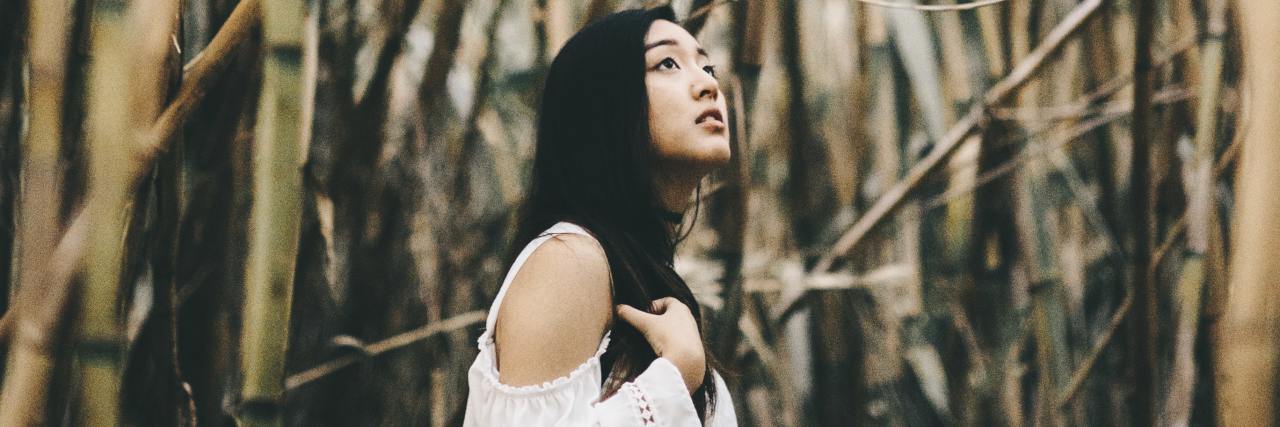The Asian and Pacific Islander Community Needs to Change Its Mental Health Narrative
Editor's Note
If you struggle with self-harm or experience suicidal thoughts, the following post could be potentially triggering. You can contact the Crisis Text Line by texting “START” to 741741. For a list of ways to cope with self-harm urges, visit this resource.
I am the black sheep in my family. I have a service dog for my invisible illness, I have not married and had kids by the time I was 25, and I have a mental illness. As much as I wish I could say my family has gotten better at supporting me in my journey and my recovery, there are still slight comments that get under my skin and remind me of how far we still have to come surrounding mental illness, especially in the Asian/Pacific Islander (API) community.
My family believes that my medication for my mental illness diagnoses has caused my invisible illness. My family constantly asks when I will come off my medication because they think I will be cured of my mental illness. Instead of asking how I am doing, they just assume that my life is all rainbows and sunshine nowadays, that I have a full-time job and supportive friends around me. I don’t give them any indication that I am struggling, though, because each time I have given them glimpses of my current mindset in the past, they just tell me to suck it up and to focus on the positive.
My family thinks my rock climbing and running have cured me of my mental illness. They think that I am excelling in my life and I no longer struggle with my depression and anxiety because I am able to get up each day, show up to work and climb each weekend. What I wish I could tell them is I still need my medication to fight the neurotransmitter imbalance in my brain. I wish I could tell them that rock climbing and running help, but they aren’t the end-all, be-all cure for my mental illness. What I wish they would understand is that my mental illness will be with me for the rest of my life, not knowing when it will come back, and I am only stable because of my medication regimen and consistent therapy.
The stigma in API culture towards mental illness is toxic. The narrative I have heard in my cultural community and from my family is that you have to be mentally tough, that you have to hide your emotions, and that anything to do with your mental health and emotions shows weakness. We can’t show weakness. I can’t speak up about the needs that I have, and what hurts the most is that I cannot turn to my family to meet the emotional needs I desire and crave.
The narrative in the API community needs to change. We need to raise our voices and let it be known that we have mental health, that mental health doesn’t discriminate. We cannot keep pretending to be tough and thick-skinned. Even in the past few months when things have been seemingly going well, I have nights where I look to how I can self-harm, how I can punish myself for my failures in my doctorate program and in my job. There have been moments where I wished I wasn’t alive, and I felt like I didn’t have anywhere to turn to or anybody to talk to because I am tough, I am resilient and I am not weak.
Here’s what I wish somebody would tell me: you can be weak. Weakness is not a sign of failure. Weakness is learning and growing from the past, identifying what you need to work on to strengthen all of you, and if that’s mental health that is weak, then work to build it up. What I wish was told to me is that I can have moments of weakness, that I do not have to carry the weight of the world on my shoulders, that I can be myself, all of myself, and I will be accepted by society. Sometimes, I feel like if I don’t fit into the narrative of a sweet, compliant, submissive, emotionless Chinese housewife, then I have failed society. Sometimes, I wish somebody would tell me that having two master’s degrees, working on my doctorate degree, holding down two jobs, while fighting my mental illness is to be admired and looked up to, not a sign of weakness. Sometimes I feel like the world’s biggest failure because I don’t fit into the narrative that society has written for me. And that makes me want to disappear and never be seen again.
Here’s to changing the narrative. Here’s to admitting to my weakness and flaws because growth and recovery should be celebrated, not dismissed and pushed under the rug. Here’s to celebrating the relapses and learning from our mistakes because we are all human and all unique, deserving of celebration and life.
Photo by Henri Pham on Unsplash

